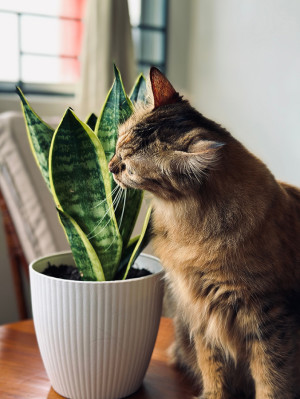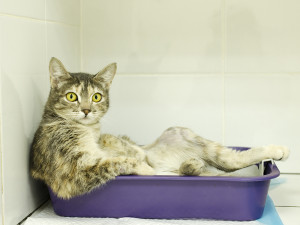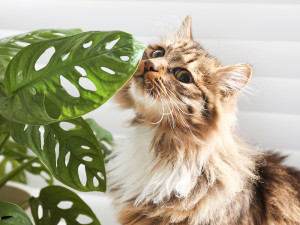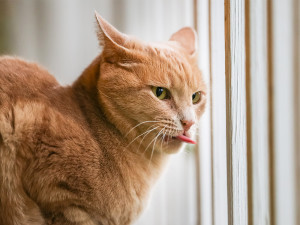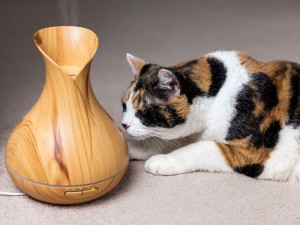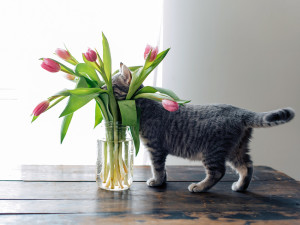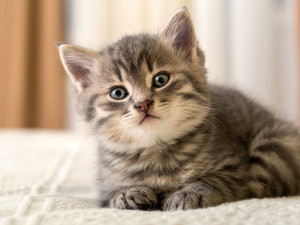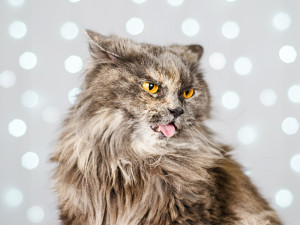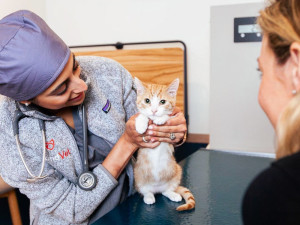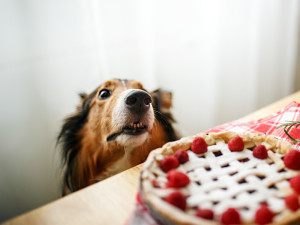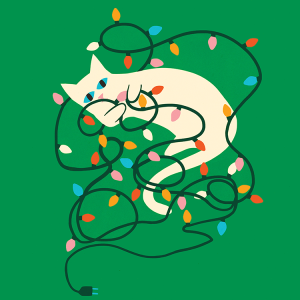Are Poinsettias Toxic to My Cat?
Maybe skip this holiday decoration if you’ve got a cat in the house—here’s why.
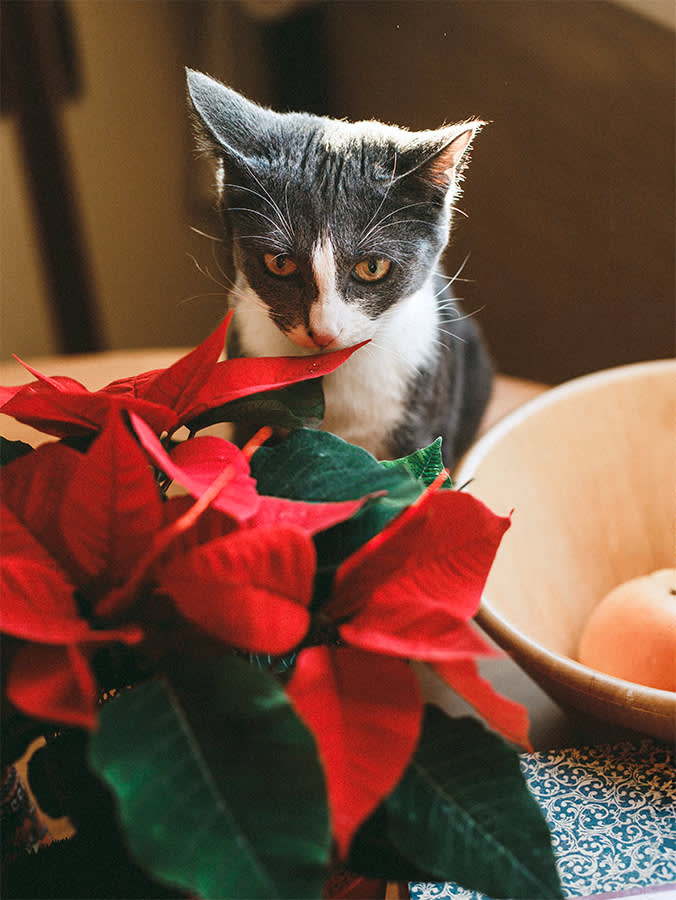
Share Article
Poinsettias, which you’ll definitely see at your aunt’s house for a holiday gathering this year, seem to be everywhere right now. But these pretty, festive plants should go under the “poison” label in your brain’s file cabinet of somewhat-dangerous things.
The truth is poinsettias are mildly toxic to almost everyone, though one study suggestsopens in new tab a 50-pound child would have to eat 500 poinsettia leaves in order to approach a toxic threshold. So, that’s good to know if your 50-pound child is the type to eat an absurd amount of leaves rather than gobs of readily available holiday sugar cookies when left unsupervised.
But what about your 11-pound child, aka your cat? Are poinsettias poisonous to cats? Yes, unfortunately, poinsettias are toxic to cats. Thankfully, similar to hypothetical 50-pound children, your cat’s symptoms of poinsettia poisoning are more likely to be gastrointestinal than fatal. That being said, there’s still a lot you should know about poinsettia poisoning and your cat.
Are poinsettias toxic to my cat?
Yes, poinsettias are toxic to cats, but try not to panic if you see or suspect your cat has eaten some of your poinsettia plants.“Their toxicity is often overestimated,” Dr. Butzer tells Kinship.

But just because this plant isn’t fatal doesn’t mean it can’t do damage, she adds: “Ingesting poinsettia leaves or flowers can still cause gastrointestinal upset, such as vomiting and diarrhea, in cats.”
Why are poinsettias dangerous to cats?
Per Dr. Butzer, the toxic part of the plant is unfortunately the most consumed by our cats. “The entire poinsettia plant contains a milky sap that can be irritating to cats, but they are the most commonly ingested parts,” she says.
Turns out, this bitter sap coats most of the plant in order to, get this, stop animals from eating it. If your cat isn’t deterred by this bitterness, they might experience several uncomfortable symptoms, such as dizziness, drooling, and gastrointestinal distress.
What should I do if my cat has eaten poinsettias?
If you witness or suspect your cat has eaten poinsettias, be on the lookout for common symptoms and have a vet’s number handy.
“If a cat ingests poinsettia leaves or flowers, they may experience symptoms like drooling, vomiting, diarrhea, and possibly a decrease in appetite,” Dr. Butzer explains. “While these symptoms are usually mild and self-limiting, it’s still essential to contact your veterinarian for guidance if you suspect your cat has consumed any part of a poinsettia plant.” Luckily, and with the guidance of your vet, treatment can usually be done at home.
Symptoms of plant poisoning in cats:
Vomiting
Diarrhea
Drooling
Tremors
Pain
Difficulty breathing
Treatment
As Dr. Butzer said, the first thing you should do if your cat has eaten any amount of a poinsettia is to call your veterinarian, who will advise you on the next steps to take. Never wait to call your vet or a poison control hotline when your cat has eaten something that is toxic to them.
Cats who are showing persistent gastrointestinal symptoms could need help with their nausea or other issues. This could mean they’ll need fluids and anti-nausea medications. Cats showing severe symptoms may need to be hospitalized.
How to prevent plant poisoning
The best way to precent plant poisoning is to keep the poinsettia out of your house. Because cats can jump to pretty much anywhere, there is no real safe place for this plant, unless you can be guaranteed that your cat cannot reach it. Better to enjoy these plants in a no-cat zone. If there is a room where your cat is not allowed and you can securely shut the door, that’s a great spot to add some holiday cheer via a poinsettia.
How do I stop my cat from eating poinsettias?
If your cat can’t resist the siren call of that bitter, milky white sap — consider placing the plant completely out of reach. “The safest way to keep poinsettias in a household with cats is to place them in an area that is completely inaccessible to your cat. This may include hanging the plant high up or placing it inside a protective enclosure,” Dr. Butzer advises.
As an added measure, consider placing aluminum foil, which many cats find unpleasant to walk on, around the plant — a tip that might h elp deter your cats from your year-round houseplants as well. Of course, the only way to keep your cat completely safe from poinsettias is to opt for a safer seasonal alternatives.
What are some holiday plants that are safe or safer for cats?
Christmas ferns: These evergreen ferns are a lovely way to add some cat-safe greenery to your holiday decor. Although the ASPCA has officially labeled them as non-toxicopens in new tab, it is still not recommended for your cat to nibble on this non-edible plant.
Christmas cactus: Originally from Brazil, the Christmas cactus is considered non-toxic to cats and dogs alike. This plant can still present as a choking and intestinal hazard, so keep extra chomp-y cats away.
Artificial plant decor: Opting for artificial plants is the surest way to keep your cat safe from any dangerous seasonal sap — or other toxic plant matter. However, similar to the Christmas cactus, artificial plants can still be choking and intestinal hazards. Unlike fresh, non-toxic plants, artificial plants don’t give off any enticing odors that might attract your cat.
What are some other plants that are not safe for cats?
Holly: According to the FDAopens in new tab, the main toxin in holly is due to a chemical group called saponins. Present in holly’s berries and leaves, this chemical can cause drooling, vomiting, diarrhea and loss of appetite in both cats and dogs.
Mistletoe: The toxic chemicals present in mistletoe are lectins and phoratoxins, both of which affect the heart. Therefore, mistletoe poisoning can cause low blood pressure and slowed heart rate in addition to gastrointestinal distress.
Pine Christmas trees: Pine Christmas trees contain pine oil, which is an essential oil. Like many essential oils, pine is toxic to cats, especially in large doses. Consider a faux alternative or opt for a safer, but not entirely non-toxic, natural tree like fir or spruce.
The bottom line: Are poinsettias poisonous to cats?
Yes, poinsettias are poisonous to cats, but their toxicity level is far lower than most people commonly think. In cats, symptoms of poinsettia poisoning are almost always contained to gastrointestinal upset, while treatment is usually supportive and can be done at home at the guidance of a vet.
However it’s still important to take poinsettia poisoning seriously and to do everything you can to prevent it. If you can, opt for non-toxic alternatives — otherwise keep poinsettias out of your cat’s reach and a vet’s number handy in case of ingestion.
FAQ (People Also Ask):
Can cats eat poinsettias?
No, cats should not eat poinsettias. The milky sap that poinsettias produce is toxic to cats.
Are poinsettias safe for cats?
Poinsettias are toxic for cats; however, their toxicity is commonly overestimated. In the event that your cat eats or licks a poinsettia plant, you should contact your vet.
How much poinsettia can cats eat?
Poinsettia is toxic to cats, but that toxicity is greatly overestimated. Cats would have to eat a significant amount of a poinsettia plant to receive a fatal dose. In smaller doses poinsettia can still cause gastrointestinal distress in your cat, though.

Rebecca Caplan
Rebecca Caplan is a writer based in Brooklyn whose work has been featured in The New Yorker, Reductress, and Vulture. She lives in Brooklyn with her perfect, toothless dog Moose.
Related articles
![A curious kitty playing with a vase of tulips.]()
Are Tulips Toxic to My Cat?
These flowers are cheerful, but you need to keep them far away from your kitty.
![Kitten sitting on a blanket]()
7 Steps to Keep Your New Kitten Happy and Healthy
With great cuteness comes great responsibility. A vet breaks down everything you need to know when you bring home a new kitten.
![grey and white cat with tongue sticking out]()
Why Does My Cat Keep Throwing Up?
Here’s when you should worry.
![A smiling veterinarian holding a cat]()
Vets Are at High Risk For Compassion Fatigue—Here Are 4 Ways You Can Help
It’s extra important to be nice to the vet in your life.
![Dog sniffing Baked raspberry pie on dining room table.]()
Thanksgiving and Christmas Foods That Are Toxic To Pets
Here’s how to celebrate safely with your pet as you gather with friends and family.
![illustration of cat playing with christmas lights]()
Holiday Safety Tips For Overly Festive Felines
Chances are, your cat is already plotting some Christmas chaos.

